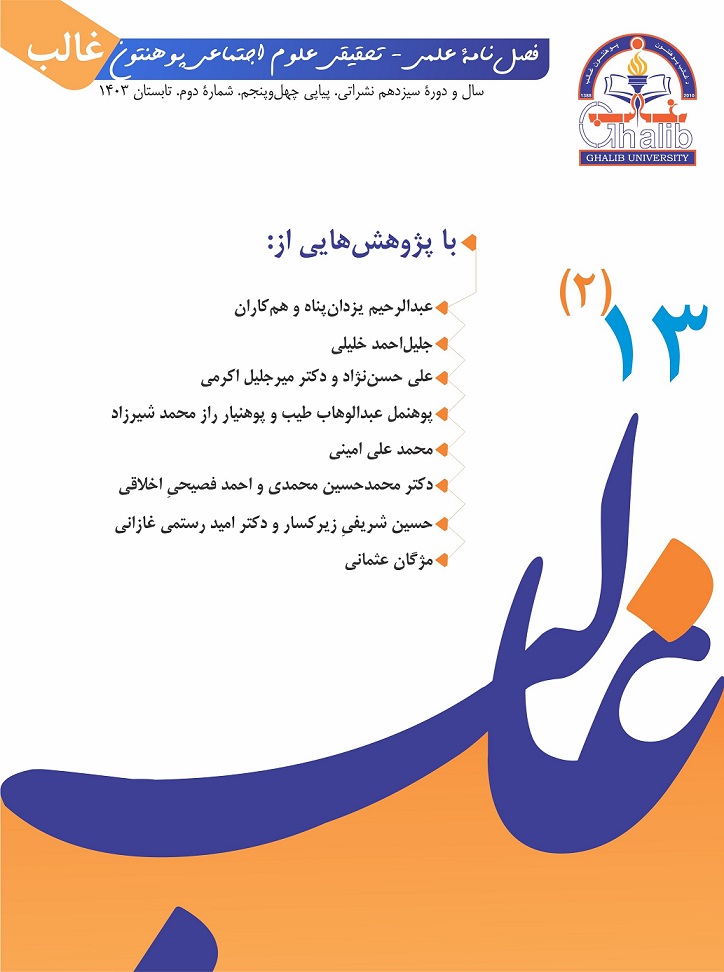Interference between Punishments for Several crimes in Islamic Jurisprudence and the Afghan Penal Code
DOI:
https://doi.org/10.58342/ghalibqj.V.13.I.2.4Keywords:
Interference, Penalty, Crime, punishment Limits, Afghanistan Penal CodeAbstract
It has been recognized in Islamic law and statutory laws that the penalties for different crimes overlap. Punishing the perpetrator of multiple crimes for a crime is considered an overlap in punishments. This research aims to apply the punishment on the criminal in the case of several crimes, as it shows the supremacy of Islamic law and its leniency towards its followers and criminals. The necessity of this research is that the intersection of punishments clarifies the aspects of pardon and facilitation in Islamic law for people who do not know the truth of Sharia law, as well as the provisions of Islamic jurisprudence in the Afghan penal code. The provisions are intended to clarify the agreement. In this research, an analytical and descriptive research strategy was chosen, and the writings of contemporary and previous jurists were studied. The jurists mentioned the intersection of punishments in their writings. The results of this study show that according to Islamic jurists and the provisions of the Afghan Penal Code, it is possible to determine punishment for several crimes, and several crimes are considered as one crime. The results of this research show that according to Islamic jurists and the provisions of the Afghan Penal Code, it is possible to determine punishment for several crimes, and several crimes are considered as one crime. If the mentioned cases differ, the penalties will not overlap.
References
۱. ابن حزم، أ. ا. (ب.ت). المحلی بالآثار. بيروت: دارالفکر.
۲. ابن قدامه، أ. ا. (۱۳۸۸هـ). المغني. قاهره: مکتبة القاهرة.
۳. ابن کثیر، أ. (۱۴۱۹هـ). تفسير ابن كثير. بیروت: دار الكتب العلمية.
۴. اصبحي، م. (۱۴۱۵هـ). المدونة. بيروت: دار الكتب العلمية.
۵. بخاري، أ. ا. (۱۴۲۲هـ). صحيح البخاري. بيروت: دار الطوق.
۶. بهوتي، م. ب. (ب.ت). کشاف القناع عن متن الاقناع. ب.ت: دارالکتب العلمة.
۷. جرجاني، ع. ا. (۱۴۰۳هـ). التعريفات. بيروت: دارالکتب العلمية.
۸. رازی، ز. ا. (۱۴۲۰هـ). مختار الصحاح. بیروت: المکتبة العصرية.
۹. سجستاني، أ. د. (ب.ت). سنن أبي داود. بيروت: المكتبة العصرية، صيدا.
۱۰. سرخسي، م. ش. (۱۴۱۴هـ). المبسوط. بيروت: دارالمعرفة.
۱۱. شافعي، أ. (۱۹۹۰م). الأم. بیروت: دارالمعرفة.
۱۲. شيرازي، أ. (ب.ت). المهذب في فقه الأمام الشافعي. بدون مکان: دارالکتب العلمية.
۱۳. عدليه وزارت. (۱۳۹۶ هـ ش). د جزا کُد. کابل: عدليه وزارت.
۱۴. عليش، م. (۱۲۹۹ هـ). منح الجليل شرح مختصر الخليل. بيروت: دارالفکر.
۱۵. عوده، ع. (ب.ت). التشريع الجنائي الاسلامي مقارنا بالقانون الوضعي. بيروت: دارالکتاب العربي.
۱۶. قرافي، ا. ش. (ب.ت). الفروق. بدون مکان: عالم الکتب.
۱۷. قرطبي، أ. ا. (۱۳۸۴هـ). تفسير القرطبي. قاهره: دارالکتب المصرية.
۱۸. قلعجي، م.؛ قنيبي، ح. (١٤٠٨ هـ). معجم لغة الفقهاء. بدون مکان: دار النفائس للطباعة والنشر والتوزيع.
۱۹. کاساني، ع. ا. (١٣٢٨ هـ). بدائع الصنائع. مصر: مطبعة الجمالية .
۲۰. هيتمي، أ. (1357 هـ). تحفة المحتاج. مصر: المكتبة التجارية الكبرى.
References
Ibn Hazm, A. A. (n.d.). Al-Muhalla bil Athar. Beirut: Dar al-Fikr.
Ibn Qudamah, A. A. (1968). Al-Mughni. Cairo: Maktabat al-Qahira.
Ibn Kathir, A. (1999). Tafsir Ibn Kathir. Beirut: Dar al-Kutub al-Ilmiyyah.
Asbaghi, M. (1994). Al-Mudawwana. Beirut: Dar al-Kutub al-Ilmiyyah.
Bukhari, A. A. (2001). Sahih al-Bukhari. Beirut: Dar al-Tawq.
Bahuti, M. B. (n.d.). Kashaf al-Qina’ ‘an Matn al-Iqna’. n.p.: Dar al-Kutub al-Ilmiyyah.
Jurjani, A. A. (1983). Al-Ta’rifat. Beirut: Dar al-Kutub al-Ilmiyyah.
Razi, Z. A. (2000). Mukhtar al-Sihah. Beirut: al-Maktabah al-Asriyah.
Sijistani, A. D. (n.d.). Sunan Abi Dawood. Beirut: al-Maktabah al-Asriyah, Saida.
Sarakhsi, M. S. (1993). Al-Mabsut. Beirut: Dar al-Ma'arifah.
Shafi’i, A. (1990). Al-Umm. Beirut: Dar al-Ma'arifah.
Shirazi, A. (n.d.). Al-Muhadhdhab fi Fiqh al-Imam al-Shafi’i. n.p.: Dar al-Kutub al-Ilmiyyah.
Ministry of Justice. (2017). The Penal Code. Kabul: Ministry of Justice.
Alish, M. (1881). Manh al-Jalil Sharh Mukhtasar al-Khalil. Beirut: Dar al-Fikr.
Awda, A. (n.d.). Al-Tashri' al-Jina'i al-Islami Muqaranan bil Qanun al-Wad'iy. Beirut: Dar al-Kitab al-Arabi.
Qarafi, A. S. (n.d.). Al-Furuq. n.p.: Alam al-Kutub.
Qurtubi, A. A. (1964). Tafsir al-Qurtubi. Cairo: Dar al-Kutub al-Misriyyah.
Qalaji, M.; Qunibi, H. (1988). Mu’jam Lughah al-Fuqaha’. n.p.: Dar al-Nafais lil-Tiba’ah wal-Nashr wal-Tawzi’.
Kasani, A. A. (1910). Bada'i' al-Sana'i'. Egypt: Matba’at al-Jamaliyyah.
Haytami, A. (1938). Tuhfat al-Muhtaj. Egypt: al-Maktabah al-Tijariyyah al-Kubra.
Downloads
Published
How to Cite
Issue
Section
License
Copyright (c) 2024 پوهنمل عبدالوهاب طيب،پوهنيار رازمحمد شيرزاد

This work is licensed under a Creative Commons Attribution 4.0 International License.













